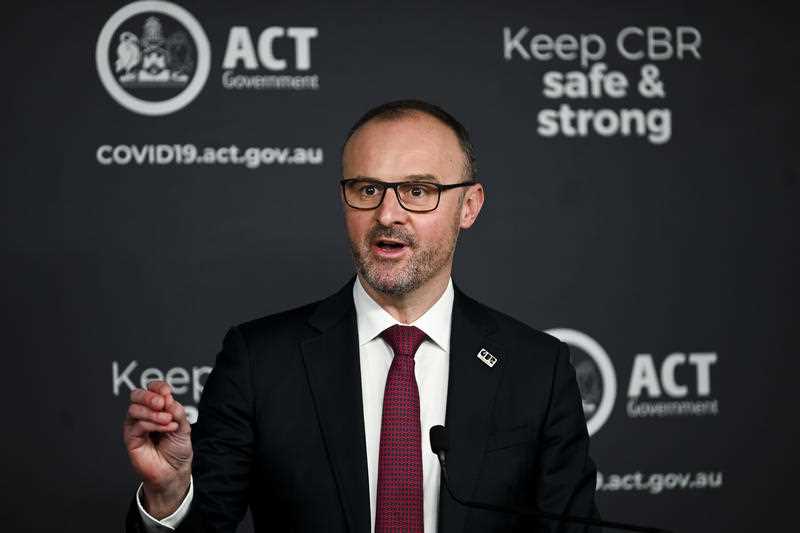Canberrans can expect lockdown restrictions to begin “gradually easing” once local and national vaccination thresholds are met in October and November, should case numbers not grow rapidly in the interim.
ACT Chief Minister Andrew Barr today indicated more detail on how exactly restrictions would ease would be provided once further information is available on local case numbers and vaccination rates “to be able to give that level of information and sufficient notice”.
“We’re not going to give one day’s notice of significant change, nor are we going to give one month or two months out from significant change.
“A rule of thumb here would be around a week in advance.”
With a lockdown checkpoint in two weeks, Mr Barr indicated some revisions and easings may be announced then.
The unanimously agreed upon National Plan to transition Australia’s National COVID-19 Response, signed off on by national cabinet, has triggers relating to the Australian average and each jurisdiction’s local vaccination rates, Mr Barr noted.
“They are the two key triggers that are necessary,” he said. “I don’t know exactly when those thresholds will be crossed.”
The Australian average will be very heavily determined by NSW and Victoria, and then Queensland, given the proportion of the nation’s population living in those states.
Yesterday’s Canberra Recovery Plan, a one-page document broadly outlines the already widely reported phases of the Doherty Institute model with some mention of what will be considered when the thresholds are met without any specifics.
Mr Barr, however, today reiterated that the transition out of lockdown in October and November will mirror what the ACT experienced last year and will include modest adjustments to home visitation numbers; gathering sizes; density limits within businesses, venues, and facilities; patronage caps; and increased outdoor activity.
There will also be a gradual return to workplaces with working from home to remain a part of the transition.
There will also be a phased return to face-to-face learning when safe to do so.
Larger events and gatherings may remain restricted for longer.
More details will be advised on these easements in the coming weeks.
Factors that will be considered when easing restrictions include local vaccination rates, community transmission including those infectious in community, testing rates, and testing turnaround times, compliance, data on effective reproductive ratio and transmission potential within our community, and the capacity of the local health system.
“Vaccination thresholds are a very strong part of the decision making, but so to is the local case numbers and the ability to test trace isolate and quarantine,” Mr Barr said.
“Right now, though, we need to give 100,000 Canberrans the opportunity to get vaccinated in the next four weeks.”

READ MORE: Call for any vaccine passport to balance human rights
Vaccine passport ‘unlikely’ in ACT
Given the strong take up across the community, Mr Barr said he doesn’t anticipate proof of vaccination will be required to access public or private services as the ACT moves through the vaccine thresholds.
“My response to that in the ACT context is that period (between 70 and 80 per cent vaccination coverage) could be as short as five days, so why would we put in place such a complex set of arrangements for five days? I think that’s a legitimate question to ask,” he said.
He said more details around proposed vaccination passports are necessary, chiefly how long the intention is to require them for.
“If it is just about a transition … you could mount an argument that that is proportional,” he said.
“Is it proposed to be in place for a longer period, and if so, how long? For the rest of the pandemic? Years? Or is to be a permanent feature of Australian society?
“Is that the sort of Australia we want to live in? is that a permanent part of our future or is just about a transition from 70 to 80 per cent?”
Get all the latest Canberra news, sport, entertainment, lifestyle, competitions and more delivered straight to your inbox with the Canberra Daily Daily Newsletter. Sign up here.
For more local news:



